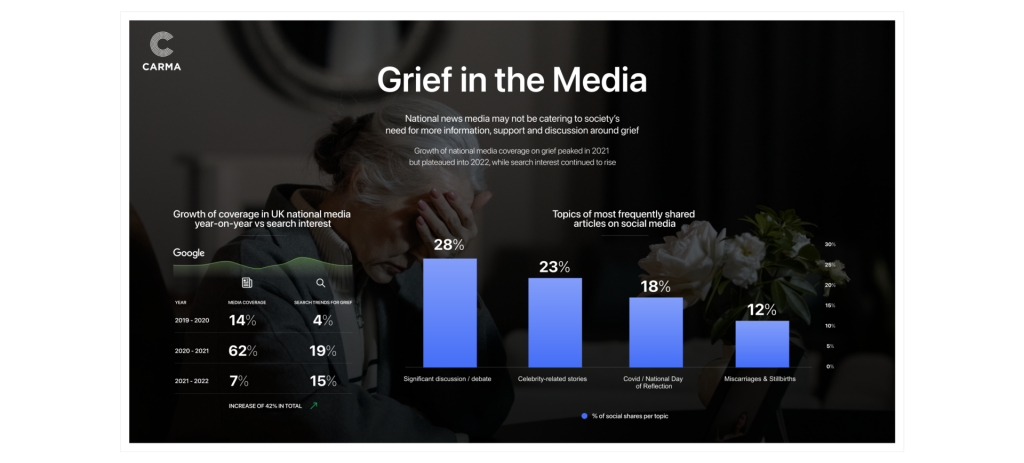Google becomes a lifeline for Brits’ mental health as searches for help increases

- Google trends for mental health support and resources around grief have increased by 42% since 2019
- Despite this, media interest favours the more sensational bereavement stories
- While stories of celebrity grief remain ever-popular but often lack any helpful resources
Marking Mental Health Awareness month, media intelligence specialist CARMA shares data from a new analysis that shows, in recent years, Brits are increasingly turning to Google search for help with grief. In fact, according to the findings, search trends for help and resources around bereavement have increased by a huge 42% in the past four years alone.
Significant world events have led to spikes in media interest in grief. The analysis shows that national coverage of the topic was up 14% from 2019 into the first year of the COVID-19 pandemic, then skyrocketing by 62% into 2021 at its peak. However, the increase in media coverage slowed between 2021-2022, only rising by 7% during this time, despite a volume spike caused by the death of Queen Elizabeth II.
Though the growth of national coverage of grief has been inconsistent in peaks and troughs, the search trends of British people tell a different story. Google searches on keywords such as ‘grief’ and ‘bereavement’ have risen steadily throughout all major world events, with no drop-off, now at their highest in the last four years.
When breaking down media types, CARMA’s analysis finds that tabloids are more likely to narrow their gaze on “grief porn” – a form of coverage focusing on sensationalising celebrity grief stories. Examples include Kelsey Parker, widow of the late Wanted star Tom Parker who died in March 2023 of brain cancer, miscarriage experiences amongst Love Islanders and Joey Essex’s story of suicide by his mother. Although they had quotes from the celebrities in question on how they have handled grief, the coverage was clickbait in nature and gossip–style in tone.
Analysis shows that broadsheet media also lean towards personal accounts of grief, but not only emphasise the stories of reality stars, but various celebrities and the general public. Broadsheet media was reflective and thought-provoking in tone, with reports on taboos and how Brits handle death, asking readers to consider how they understand and approach grief and bereavement. While these poignant experiences are felt by many, more needs to be done to build a constructive space for people to share, debate and learn rather than just absorb the experiences of others.
Orla Graham, Insights Consultant at CARMA, says, “Grief is an important conversation in all parts of society, yet there is nowhere near enough discussion about it. Our data shows a gap between the grief information Brits are searching for online and the information the media are sharing on the same subject. From this, it’s clear there is still a taboo around how bereavement is approached and people are still unsure about how to start the conversation.
“This is a huge consideration for bereavement organisations to overcome when planning communications. While our data shows the need for information and support from search trends is there, the space for that information to be published and discussed is disappointingly limited in UK media. It’s a responsibility of us all to create open, honest and constructive conversations Brits can use to navigate arguably the most difficult life experience we will all face.”
Behind the ‘Stiff Upper Lip’
The famed ‘stiff upper lip’ of British culture means historically, the nation has a closed approach to grief and death that is considered a personal thing to deal with. Whereas cultures such as Ireland have open caskets in homes, and Mexico, celebrate the Day of the Dead, a colourful holiday to remember life and death. But the data suggests that Brits are increasingly pushing against their stereotype in a fight to deal better with their mental health.
Further analysis of social media found that, across 2022, detailed articles on grief that addressed its taboos were the most frequently shared on Twitter and Reddit, with COVID-19 being the most discussed topic related to grief. On Facebook, miscarriages and stillbirths were most frequently talked about, particularly relating to bereavement leave, implementing official policies and encouraging others to speak up about what they are dealing with. The data shows an increasing need amongst Brits for more discussions around grief and contribution from authoritative sources that provide real support and information to those struggling.
For Mental Health Awareness Month, now could not be a better time to speak to a loved one and reach out for help from the many organisations offering bereavement support and information for free.


